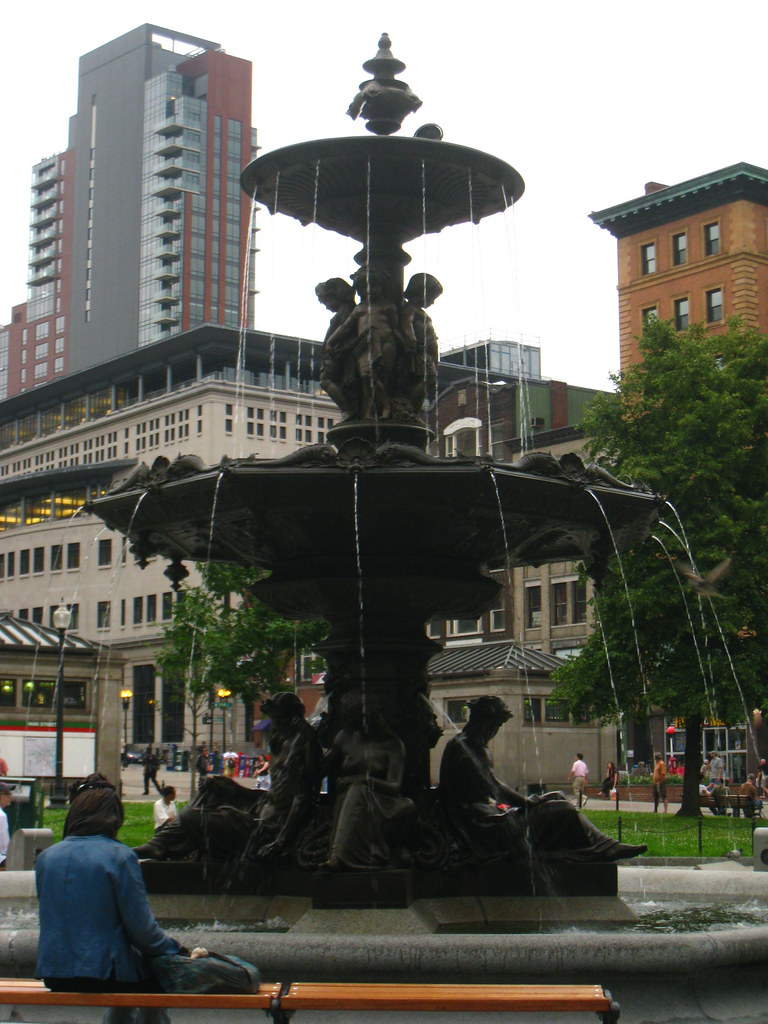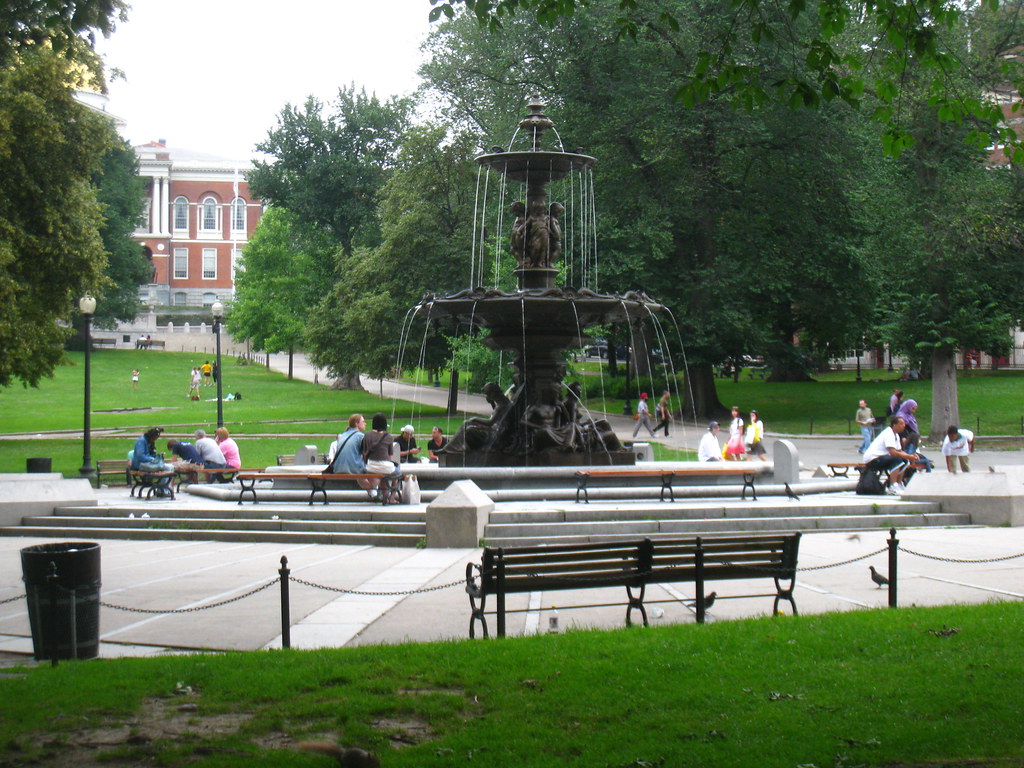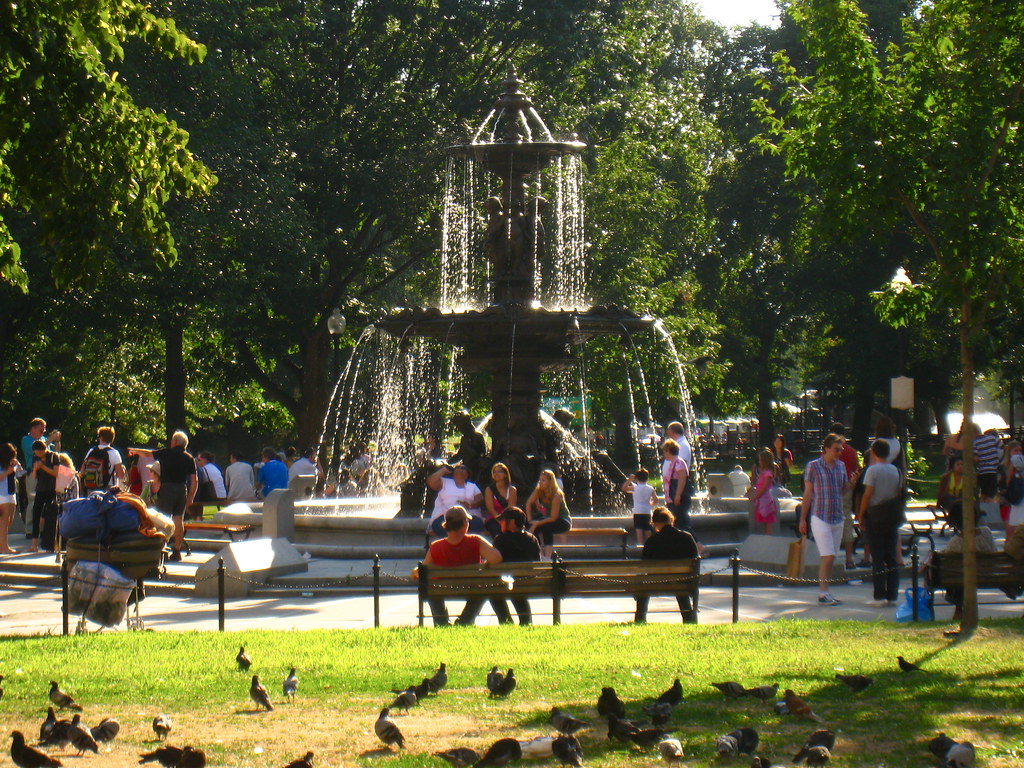The Common may go corporate
Group hires consultant who secured funds for NYC park
By Andrew Ryan, Globe Staff | September 16, 2010
The cracked concrete, missing bricks, and growing patches of bald earth on Boston Common have pushed boosters to consider a new initiative: tapping corporations to sponsor repairs and improvements to America?s first park.
Picture a neatly planted flower bed with a discreet sign crediting a bank for the blossoms. A petite placard alerting park-goers that the Common?s new WiFi comes compliments of a prominent software company. Or an engraved stone subtly attributing a refurbished plaza ? with chess boards, moveable tables and chairs, and a portable lending library ? to the generosity of a national department store.
?We think the time has come,?? said Henry Lee, president of the Friends of the Public Garden, which also advocates for the Common. ?Given the state of the park, given the state of the economy, we have to do this in a modest, careful, appropriate way.??
For the past year, the Friends group has employed a prominent New York City parks consultant with a knack for securing corporate sponsorships. Daniel A. Biederman helped pull Manhattan?s Bryant Park back from the brink of urban decay in the 1970s. The dynamic green on 42d Street now teems with innovative activities from ping-pong to ice skating, underwritten with checks from such companies as Google and Southwest Airlines.
The push to emulate some of the Manhattan ideas in Boston has not moved beyond discussions, but the effort to find corporate partners has already won the qualified support of key local power brokers, including Mayor Thomas M. Menino and Michael P. Ross, City Council president. It underscores a new fiscal reality in which shrinking budgets have forced municipalities to embrace creative sources of revenue.
While no major sponsorships have been inked, Biederman said he is in serious talks with a corporation ? which he would not disclose ? about helping pay for more improvements near the recently refurbished Brewer Fountain along Tremont Street.
?This company is a huge national company you?ve heard of,?? Biederman said last week as he walked on the Common, stepping on black asphalt patched over broken concrete. ?They have to get back a little bit of credit, but where I?ve worked with them elsewhere it?s been very, very restrained. And they?ve given a lot of money.??
Credit in Bryant Park comes on small porcelain signs in flower beds, on umbrellas with a corporate logo, and in the outdoor Reading Room, where green shelves say ?sponsored by HSBC Bank.??
?Biederman did a nice job in New York. Is that replicable here? We have to see. Boston is not New York,?? Menino said in a recent interview. ?Would I support little attributes saying this crosswalk is sponsored by Millennium Partners? I probably could support that in a tasteful way. But I?m not going to have banners hanging all around the Common and making it a circus atmosphere.??
Purchased in 1634 when each Boston household kicked in at least six shillings, the Common has endured as shared space. It remains Boston?s largest stage, hosting military exercises and religious revivals, political rallies, and concerts. Headliners have varied from George Washington to singer Judy Garland to Pope John Paul II to the evangelical preacher Billy Graham.
The extraordinary use has always outweighed the care, Lee said, even before the most recent recession. In the past two years, almost $1 million was cut from the city?s Parks and Recreation Department, which now has an annual budget of just over $15 million.
In addition to corporate sponsors, Lee wants the city to charge upkeep fees to film crews and the more than 250 groups a year that hold events on the Common, from Sarah Palin and the Tea Party Express to the annual Freedom Rally to legalize marijuana.
Event organizers and movie makers are required to pay park rangers and clean-up crews, but they are not charged fees to offset wear and tear, though some make voluntary donations. Film crews, for example, give about $60,000 annually for work done in all city parks.
?No one wants to see the Common become overly commercialized,?? said Ross, who led a City Council trip to New York City in 2008 to several green spaces, including Bryant Park, where they met Biederman. ?I don?t believe that?s a threat here. It?s not an either-or proposition. We can do more on the Common.??
Any changes to the Common must be approved by the city?s Parks and Recreation Department and the Landmarks Commission. Watchdogs such as the Boston Preservation Alliance expressed openness to the concept on a modest scale.
?In the initial stages, we would prefer to see something temporary as opposed to something permanent,?? said Sarah Kelly, executive director. ?Some of this is obviously experimental. You want to test out what is or isn?t going to work.??
Subtle touches of commercialization are already present on the Common. There are the Lily Pad Cafe near the Frog Pond and a 1,300-space underground parking garage operated by the Massachusetts Convention Center Authority. The Boys & Girls Clubs collects monthly rent from three dozen vending carts, netting an annual profit of about $125,000, of which 60 percent goes to the parks department, said Patricia Gannon, chief financial officer of the Boys & Girls Club.
The Friends of the Public Garden administers a memorial bench and tree program, which includes a plaque with the name of the donors. To raise money for the imminent $1.4 million overhaul of the plaza around Brewer Fountain, the asking price is $5,000 per tree and $25,000 per bench.
Both the Friends and Biederman declined to disclose how much his consulting firm is being paid for the work on the Common.
Earlier this week, a private tour guide clad in a tricorn hat and tan breeches stood on a dusty patch of dirt as he regaled tourists with stories of the American Revolution. At the foot of a nearby pin oak, a small plaque noted that the tree had been donated by Paper Mills Inc. honoring the ?environmental excellence?? of Staples.
?We are constantly bombarded by advertisements, and I feel like a park should be a place to ease your mind,?? Chlo? Oldfather, a 21-year-old student at Suffolk University, said as she sat nearby on a green bench with broken slates. ?There is obviously a need, but people also need a sanctuary from the constant chatter.??
Andrew Ryan can be reached at
acryan@globe.com.



